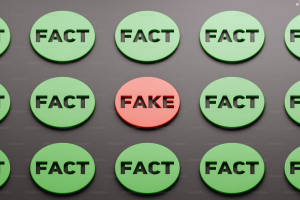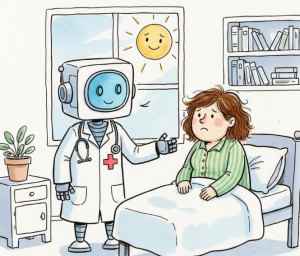
Misinformation as a Social Determinant of Health
We spent a while recounting APHA last week. However, there’s a specific trend we wanted to explore in more depth: misinformation.
Misinformation has become a fundamental force that directly impacts health outcomes. Traditionally, social determinants of health (SDOH) focus on people’s living, working, and aging conditions, but emerging research, including new findings presented at the 2025 APHA Annual Meeting, indicates that the information ecosystem itself now plays an equally influential role. From culturally targeted vaccine narratives to AI-generated influencers and digital literacy gaps, misinformation influences health behavior, access, and trust on a broad scale. This synthesis draws from recent insights from APHA, emphasizing how these dynamics interact with inequality, structural barriers, and community trust.
How Misinformation Interacts with Social Determinants
Undermining Trust in Healthcare Systems
Trust is one of the most reliable predictors of whether people engage with healthcare, and misinformation erodes that trust across various populations. Research from Nigeria has illustrated how false narratives about outbreaks and vaccines can weaken community participation in health programs. APHA research further shows that communities such as South Asian Americans are often exposed to negative or false vaccine messages on platforms like X/Twitter. Posts that misrepresent trial data, inflate side effects, or downplay disease severity create a digital environment that fosters distrust, especially when those posts evoke more emotion than facts.
Conversely, APHA case studies, such as Albany, Georgia’s COVID-19 initiative, demonstrate that trust can be restored when messaging comes from community organizations, faith leaders, and minority-serving institutions. When trusted messengers led vaccine education efforts, vaccine confidence grew by showing how misinformation interacts with the SDOH framework by either disrupting or reinforcing the trust infrastructure essential for health engagement.
Impact on Nutritional Health, Reproductive Health, and Everyday Health Behaviors
Misinformation influences decisions well beyond vaccination and has a profound impact on nutrition, reproductive health, and preventive care for chronic diseases. Misleading nutritional advice disproportionately harms disadvantaged communities that already have limited access to healthy food or preventive services. APHA expanded this understanding with new evidence showing that up to 40% of sexual and reproductive health information online is false or misleading. This misinformation is especially damaging to low-income individuals and those in restrictive states who depend heavily on digital platforms for guidance.
APHA research shows AI-enabled SRH chatbots, if well-designed with privacy, cultural relevance, and clear communication, can combat misinformation and aid decision-making. However, without improved media, digital, and health literacy, misinformation will persist, fueling unhealthy behaviors and increasing disparities in preventive care.
Influence on Policy and Racial Disparities
Misinformation is unevenly distributed; it aligns with racial injustices and worsens disparities by influencing how groups view risk, policies, and health systems. Misinformation about race-based health disparities can alter policy preferences in ways that reinforce inequalities. Older adults who encounter more online health misinformation are more likely to seek health info online, increasing exposure and digital vulnerability.
For transgender and gender-diverse people in the Midwest, healthcare misinformation worsens provider inexperience, stigma, and limited access to affirming care, leading to poorer mental health and HIV prevention gaps. These examples show how misinformation amplifies racism, discrimination, and underfunding, acting as a structural factor in health inequities.
Amplifying Barriers to Routine Care, Especially Vaccination
Misinformation is also altering baseline preventive care, including routine childhood vaccination. A systematic review presented at APHA showed that the pandemic not only increased access barriers but also raised parental hesitancy, even among families that had previously vaccinated without issues. Increased risk perception, political distrust, and misinformation-driven skepticism now make parents less willing to pursue routine immunizations.
Pre-bunking, the strategy of priming people with accurate, persuasive arguments before they encounter misinformation, has shown promising results: caregivers exposed to strong pro-HPV messages have become less vulnerable to misleading claims and more likely to vaccinate their children. Additionally, findings from South Asian American digital spaces revealed that misinformation about HPV, measles, and COVID-19 spreads within online diasporic networks, increasing hesitancy. These studies collectively demonstrate that misinformation now contributes to transportation gaps, cost barriers, and provider shortages, serving as a structural obstacle to preventive care.
Weakening the Public Health Workforce and Fragmenting Public Narratives
Finally, misinformation impacts the health system itself by altering the public information landscape and making the work of public health professionals more difficult. APHA sessions on leadership highlighted how disinformation has changed public expectations, making empathy, transparency, and scientific integrity crucial for rebuilding trust. The emergence of AI-generated influencers and unregulated “expert personas” presents new dangers, as these accounts spread false health advice without accountability or oversight.
The de Beaumont Foundation’s infodemiology work emphasizes the importance for health agencies to systematically monitor and analyze misinformation just as they do with disease outbreaks, indicating a shift toward considering misinformation surveillance as essential infrastructure. Simultaneously, gaps in digital, media, and critical literacy, outlined in the updated eHealth Lily Model, threaten the public health workforce’s ability to communicate effectively. Together, these insights demonstrate that misinformation not only damages communities but also undermines institutional capacity, making it one of the most significant social determinants of health (SDOH) in the digital age.
Moving Forward: Addressing the Infodemic as a Structural Health Issue
The APHA findings emphasize the need for public health to go beyond fact-checking and adopt a systemic, structural approach to the information environment. Community-based communication, culturally tailored outreach, CHW-led translation efforts, privacy- and equity-focused AI tools, strong leadership communication, and coordinated infodemiology networks are essential for reducing the harmful influence of misinformation across populations.
Ultimately, accurate information, delivered by trusted messengers in accessible formats, serves not only as a resource but also as a vital factor that influences whether communities can make informed decisions, connect with healthcare, and lead healthy lives.



